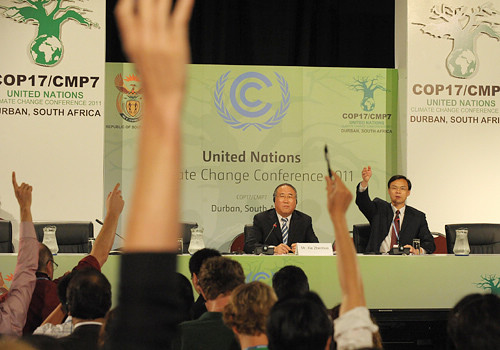|
 |
|
CHINA'S VOICE: China's top climate negotiator and NDRC Vice Chairman Xie Zhenhua (left) holds the Chinese delegation's first press conference in Durban on December 5, 2011 (LI QIHUA) |
Though the results of the UN Climate Change Conference in Durban are not perfect, at least they are progress in a phasal sense, said Chinese and foreign analysts.
The UN Climate Change Conference was completed after a prolonged negotiation in Durban, South Africa, on December 11, 2011, two days later than planned due to serious disputes among negotiating parties. After difficult negotiations, a package of resolutions was passed by representatives from more than 200 countries and international organizations.
The resolutions include agreements on the implementation of the second commitment period of the Kyoto Protocol, the launching of the Green Climate Fund and other issues.
"The conference in Durban reached agreement on the two major concerns of China and other developing countries: the second commitment period of the Kyoto Protocol and the Green Climate Fund," said Zhou Dadi, Director General (emeritus) of the Energy Research Institute affiliated to the National Development and Reform Commission (NDRC) of China.
"The conference charted the future for the global climate action after this conference and before 2020. Now the world can start to discuss plans after 2020. This is significant progress," said Zhou.
Zhou's opinion was echoed by UN Secretary General Ban Ki-moon. The package of resolutions is a significant step forward in global climate efforts, said Ban.
The resolutions passed at the closing of the conference were not perfect, but they were a landmark for global climate action, said Maite Nkoana-Mashabane, South African Minister of International Relations and Cooperation and also president of the just concluded United Nations Climate Change Conference.
According to the resolutions, an Ad Hoc Working Group on the Durban Platform for Enhanced Action will be established. It will be responsible for formulating a legal instrument or legal result applying to all parties to the United Nations Framework Convention on Climate Change. The establishment work will start in the first half of 2012, and be completed no later than 2015. Based on this legal instrument, all the parties to the convention will discuss emissions reduction beginning from 2020.
What's more, the second commitment period of the Kyoto Protocol will be officially approved of at the next UN Climate Change Conference in Qatar in 2012, and come into effect in 2013. And a new climate treaty including the United States and emerging countries such as China and India should be reached before 2015 and come into effect after 2020.
The Kyoto Protocol is the only legally binding agreement that sets targets for major developed countries. It was passed in December 1997 and came into effect in February 2005. Its first commitment period will expire at the end of 2012.
Moreover, the conference decided to officially launch the Green Climate Fund and establish its governing instrument. Building on the commitment by developed countries to transfer $100 billion a year by 2020 to developing countries for adaptation and mitigation, the Green Climate Fund will be essential for channeling funds to developing countries.
Also, the package of resolutions includes documents on monitoring and verification rules of emissions reduction, forest protection and clean-energy technology transfer to developing countries.
"However, the disputes among the negotiating parties will exist for a long time," said Zhou.
The United States has held a negative attitude toward climate change. Even when the U.S. economy was in good shape, it presented little will to contribute to this international public cause. Neither did it show the willingness of aiding developing countries, said Zhou.
| 